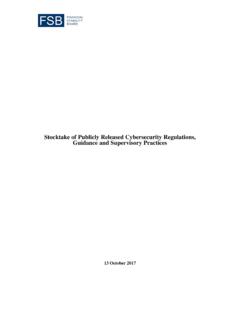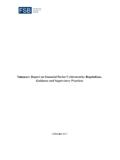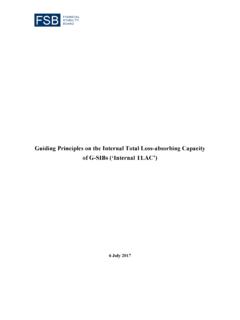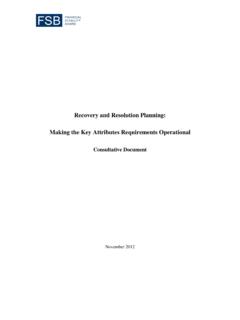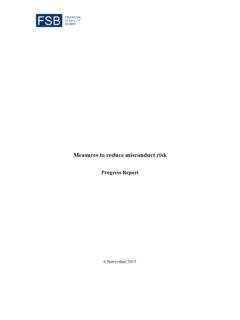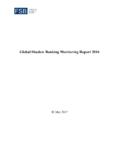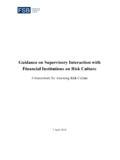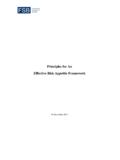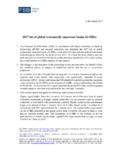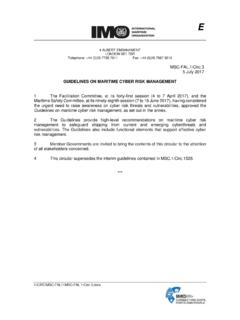Transcription of Cyber Lexicon - fsb.org
1 Cyber Lexicon 12 November 2018. The Financial Stability Board (FSB) is established to coordinate at the international level the work of national financial authorities and international standard-setting bodies in order to develop and promote the implementation of effective regulatory, supervisory and other financial sector policies. Its mandate is set out in the FSB Charter, which governs the policymaking and related activities of the FSB. These activities, including any decisions reached in their context, shall not be binding or give rise to any legal rights or obligations under the FSB's Articles of Association. Contacting the Financial Stability Board Sign up for e-mail alerts: Follow the FSB on Twitter: @FinStbBoard E-mail the FSB at: Copyright 2018 Financial Stability Board.
2 Please refer to: Table of Contents Introduction .. 1. 1. Objective of the Lexicon .. 3. 2. Development of the Lexicon .. 4. Process for developing the Lexicon .. 4. Selection of terms included in the Lexicon .. 4. Criteria used in developing definitions for terms in the Lexicon .. 5. Annex: Cyber Lexicon .. 7. iii iv Cyber Lexicon Introduction Cyber incidents are a threat to the entire financial system, a fact that is underscored by recent reports of significant and damaging incidents both inside and outside the financial sector. The 2016 attack on the Bangladesh Bank resulted in the theft of $81 million, the WannaCry ransomware attack in 2017 infected more than 250,000 computer systems in 150 countries, and the Equifax hack in 2017 resulted in the compromise of personal information of over 146.
3 Million individuals. 1 Cyber risk to financial institutions is driven by several factors, including evolving technology, which can lead to new or increased vulnerabilities; interconnections among financial institutions and between financial institutions and external parties, through cloud computing and FinTech providers who in some cases may not be subject to regulation by financial sector authorities; determined efforts by Cyber criminals to find new methods to compromise ICT systems; and the attractiveness of financial institutions as targets for Cyber criminals seeking illicit financial gain. 2 Recognising the risks from Cyber incidents, authorities across the globe have taken regulatory and supervisory steps designed to facilitate both the mitigation of Cyber risk by financial institutions, and their effective response to, and recovery from, Cyber incidents.
4 The Communiqu issued at the March 2017 meeting of the G20 Finance Ministers and Central Bank Governors in Baden-Baden noted that the malicious use of Information and Communication Technologies (ICT) could disrupt financial services crucial to both national and international financial systems, undermine security and confidence and endanger financial stability. 3 With the aim of enhancing cross-border cooperation, the Financial Stability Board (FSB) was asked, as a first step, to perform a stocktake of existing relevant released regulations and supervisory practices in G20 jurisdictions, as well as of existing international guidance, including to identify effective practices.
5 In October 2017, the FSB delivered the requested stocktake report regarding existing publicly available regulations and supervisory practices 1 See How Cyber criminals targeted almost $1bn in Bangladesh Bank heist , Financial Times, 18 March 2016, ; Ransomware Cyber -attack threat escalating . Europol , BBC, 14 May 2017, ; and Form 8-K of Equifax Inc. (filed 7. May 2018), 2 For a discussion of Cyber risk in the context of FinTech ( technology-enabled innovation in financial services), see FSB, Financial Stability Implications from FinTech: Supervisory and Regulatory Issues that Merit Authorities' Attention, 27 June 2017, For an example of the evolution of attack methods, see B.
6 Krebs, Source Code for IoT Botnet Mirai' Released , 1. October 2016, For an outline of the high yield of recent attacks targeting the financial sector, see C. Wueest, Symantec, Financial Threats Review 2017, Targeted financial heists , May 2017, 3 See G20, Communiqu : G20 Finance Ministers and Central Bank Governors Meeting, Baden-Baden, Germany, 17-18. March 2017, 1. with respect to Cyber security in the financial sector to the Finance Ministers and Central Bank Governors meeting in Washington, DC. 4 The Ministers and Governors welcomed the FSB. stocktake report, asked the FSB to continue its work to protect financial stability against the malicious use of ICT and noted that this work could be supported by the creation of a common Lexicon of terms that are important in the work being pursued.
7 5 After public consultation, the FSB has developed and is publishing a final Lexicon of terms related to Cyber security and Cyber resilience. 6. 4 See FSB, Stocktake of Publicly Released Cybersecurity Regulations, Guidance and Supervisory Practices, 13 October 2017, ; and FSB, Summary Report on Financial Sector Cybersecurity Regulations, Guidance and Supervisory Practices, 13 October 2017, practices/. 5 See G20, Chair's Summary: G20 Finance Ministers and Central Bank Governors Meeting, Washington, , USA, 12- 13 October 2017, ;jsessionid=B6890 DCD16EB588B45663F2C579BF598?__blob=publi cationFile&v=2. 6 See FSB, Cyber Lexicon Consultative Document, 2 July 2018, document/.
8 2. 1. Objective of the Lexicon The objective of FSB work to develop a Cyber Lexicon is to support the work of the FSB;. standard-setting bodies (SSBs), including the Basel Committee on Banking Supervision (BCBS), Committee on Payments and Market Infrastructures (CPMI), International Association of Insurance Supervisors (IAIS) and International Organization of Securities Commissions (IOSCO); authorities; and private sector participants, financial institutions and international standards organisations, to address Cyber security and Cyber resilience in the financial sector. The Lexicon is not intended for use in the legal interpretation of any international arrangement or agreement or any private contract.
9 A Lexicon could be useful to support work in the following areas. Cross-sector common understanding of relevant Cyber security and Cyber resilience terminology. A Lexicon could be useful to foster a common understanding of relevant Cyber security and Cyber resilience terminology across the financial sector, including banking, financial market infrastructures, insurance and capital markets, and with other industry sectors. A common understanding across the financial sector, including among authorities and private participants, could help to enhance Cyber security and Cyber resilience throughout the sector. More broadly, a common Lexicon could foster a common understanding with other industry sectors and facilitate appropriate cooperation to enhance Cyber security and Cyber resilience.
10 Work to assess and monitor financial stability risks of Cyber risk scenarios. As the FSB and its members work to assess and monitor financial stability risks associated with Cyber incidents, the work could be supported by a Lexicon that promotes a common understanding concerning the terminology related to Cyber risks. For instance, as part of its regular assessment of vulnerabilities in the global financial system, the FSB from time to time considers the potential for operational risks, including Cyber risks, to result in shocks that could be transmitted across the financial system. Information sharing as appropriate. A Lexicon that facilitates a common understanding across the financial sector, including public and private participants, and also across jurisdictions, could be useful in efforts to enhance appropriate information sharing.
